- Home
- Richard Matheson
The Gun Fight Page 9
The Gun Fight Read online
Page 9
Louisa swallowed and managed another smile. “Well,” she said, “thank you, Mrs. Cartwright.”
Mrs. Cartwright looked toward the back of the shop with forced casualness. “Oh, there’s your aunt,” she said, obviously disappointed that she wasn’t alone with Louisa. “How do, Miss Winston.”
Agatha Winston raised her head, smiled a merchant-to-buyer smile, nodded once, then returned grimly to her figures.
“May I . . . help you?” Louisa asked.
The gaze of her customer stabbed back at her. A smile was arranged on Mrs. Cartwright’s puffy lips.
“I’d like to get a shirtwaist, my dear,” she said. “Silk. For my girl. She’s sixteen next week, you know.”
“Oh,” Louisa said, trying to sound pleasantly surprised.
She could almost feel the portly woman’s eyes on her back as she fingered through the stack of shirtwaists in the drawer. A prickling sensation coursed her back, making her shudder. She drew in a quick breath and turned.
“No silk, Mrs. . . . Cartwright,” she finished weakly as the older woman forced the look of a buying customer on her face again.
“Oh. I’m sorry to hear that,” said Mrs. Cartwright. “Well . . . perhaps . . . cotton?”
Louisa put the shirtwaist on the counter and stood there restively while the woman fingered it distractedly.
“This is the f-inest type sold in the market,” Louisa said without expression. “You’ll . . .”
She stopped as Mrs. Cartwright looked at her. The plump woman couldn’t hide the look in her eyes. Aware of it, she stopped trying. She directed a furtive glance at Miss Winston, then smiled sadly.
“My dear girl,” she said, behind the sympathy a probing inquisitiveness, “I’ve heard about this . . . terrible thing and I’m . . . I’m so shocked.”
Louisa couldn’t speak at first. She felt the heat licking up her cheeks again and had to press her lips together to keep them from shaking. She wanted to turn and run away but she knew she couldn’t so she just stood there staring wordlessly, feeling Mrs. Cartwright’s beady eyes on her, attempting to reflect compassion but conveying only a hungry curiosity.
“I’ll ask my . . . my aunt to ah-show you another kind of—” she faltered, then turned away abruptly.
“But my dear, this is—”
Her skirt rustled noisily as she hurried up the counter, trying vainly to keep the hot tears from spilling any faster across her flushed cheeks.
“Aunt . . . A-Agatha,” she sobbed.
Agatha Winston looked up suddenly, face a blank of consternation.
“What on earth . . .” she started, then stopped, her dark eyes staring at Louisa’s anguished face.
“Please,” Louisa begged, “I . . . I . . .” She couldn’t finish.
Agatha Winston glanced up at the customer, then back at her trembling niece. “Go in the back room,” she said. “Quickly.”
As Louisa stumbled away, cutting off a choking sob, Miss Winston moved in firm strides down the counter.
“I’m so sorry, Mrs. Cartwright,” she said in a politely brittle voice. “Now what were we looking at?”
Mrs. Cartwright glanced back toward where Louisa was entering the back room.
“What did I say?” she asked. “My dear Miss Winston, I had no intention of—”
“It’s nothing, nothing,” Miss Winston assured hastily, plucking up the shirtwaist. “She’s just a little upset. Is this what we’re interested in today? Now this material is woven by the finest New England lo—”
She stopped talking and glared at Mrs. Cartwright who was looking toward the back of the shop again and acting upset.
“Mrs. Cartwright?” she asked.
The large woman looked at her, head shaking sadly. “Oh, my dear Miss Winston,” she proclaimed, “my heart goes out to that poor girl.”
Miss Winston stiffened. “I beg your pardon?” she said.
Again, Mrs. Cartwright glanced toward the back room. Then she leaned over the counter.
“Do you really think she should . . . wait counter when . . .” She gestured futilely. “Well . . .”
“Mrs. Cartwright, I’m afraid I do not know what you are talking about,” Miss Winston enunciated slowly, torn between rising anger and the unquestioning demeanor she believed all customers merited.
Mrs. Cartwright looked unhappy. “Oh, my dear,” she said in a sort of joyous agony at being involved in this moment. “We’re all lambs in the Lord’s flock. When one of us is led astray . . .”
She didn’t finish. Lambs?—Miss Winston thought—led astray? Her eyes grew harder still behind her forgotten spectacles.
“Mrs. Cartwright, I’ll thank you for an—”
“Oh, my dear Miss Winston. I feel nothing but sympathy for your poor dear niece. I would not for the world—”
“Mrs. Cartwright, what are you talking about?” Miss Winston demanded, putting aside, for the moment, the role of courteous vendor.
Mrs. Cartwright put her ample hand on the unresponsive fingers of Miss Winston.
“I know all about it,” she whispered. “And it has made my heart go out to that poor, dear girl.”
“What, exactly, do you know?” Miss Winston asked, face beginning to go slack now with the rising fear that she did not know everything.
Mrs. Cartwright looked around, looked back.
“About the baby,” she whispered. “The—”
“What!” Miss Winston’s virginal body lurched in shock, her fingers jerking out from beneath the moist warmth of Mrs. Cartwright’s hand. “What are you talking about! Are you intimating that Louisa is—”
Her hands jerked into bone-jutting fists. “Oh!” she said, absolutely dumbfounded.
Mrs. Cartwright drew back in alarm. “What have I—?”
“I don’t know where you heard this vicious gossip, Mrs. Cartwright!” Agatha Winston said, eyes burning with vengeful light, “but, let me end it now—right this very moment! It is not true, Mrs. Cartwright, it is not true at all! I’m shocked that you should believe such a terrible thing of my niece! Shocked, Mrs. Cartwright, shocked!”
“Oh, my dear Miss—”
“No. No. I don’t want to hear anymore!” Miss Winston blinked as a wave of dizziness rushed over her. Her hands clutched at the counter edge. “Please leave,” she muttered. “Please, leave my shop.”
“Oh . . .” Miss Cartwright moaned, face a wrinkle of dismay.
Miss Winston turned away. “Please,” she begged. “Please.”
When a shaken Miss Cartwright had retreated from the shop, an equally shaken Miss Agatha Winston found her unsteady way to the rear of the shop, throat constricted, eyes stark with premonition.
Louisa drew back in fright when she saw her aunt’s face.
“Aunt Agatha,” she whispered.
She gasped aloud as the clawing hand of her aunt clamped over her wrist.
“Tell me!” commanded Agatha Winston, her face terrible. “Is it true?”
Louisa shrank back. “What?” she asked, weakly.
“You had better tell me the truth!”
Louisa started sobbing again. “What?” she asked. “What, A-Aunt Agatha?”
Agatha Winston spoke slowly, teeth clenched. “Are you with child?”
Louisa gasped and stared blankly at her aunt, a heavy throbbing at her temples, legs shaking. She cried out suddenly as her aunt’s hard fingers dug into her wrist.
“Answer me!” Agatha Winston cried, almost hysterically, her face mottled with an ugly rage.
“No!” Louisa sobbed. “No, I’m not. I’m not!”
A moment more did the two look at each other.
“Is that the truth?” Agatha Winston demanded tensely.
“Yes,” Louisa insisted, tearfully. “Yes.”
Miss Winston released her niece’s wrist and sank down weakly on a stool, chest heaving with breath, in her lap, her hands trembling impotently.
“Dear Lord,” she muttered hoarsely. “Dear Lord,” her
gaunt throat moving as she swallowed.
Louisa stood nearby, her body twitching with deep, unheard sobs. She wanted to run away but she was afraid to. Her mind swam with confused fears. With child?—she thought in a panic. Dear God, what was happening? She felt as if she were lost and helpless in a strange pit of terrors.
“Someone will pay for this,” she heard her aunt muttering to herself. “Someone will pay.”
That was when they heard bootfalls in the shop entrance.
Louisa glanced over her shoulder to see who it was. Abruptly, she shrank back, eyes stark with fright, a gasp clutching at her throat. Instinctively, she drew to one side, away from the back room doorway.
Agatha Winston looked up, nerves about unstrung. “What is it now?” she hissed.
“It’s . . . it—it’s him!” Louisa whispered frantically.
Agatha Winston stood up quickly and stepped to the doorway.
Her thin nostrils flared, a calcification of outrage ran down her back. Hurriedly, she stepped away from the doorway.
“Stay back here,” she ordered. “Don’t move.” Her agitated hands flew to her gray hair, to her skirt.
“Stay here,” she said again, then moved out of the room and went behind the counter.
John Benton took off his hat as she approached him. He nodded his head politely and waited until she’d reached him.
“Afternoon, ma’m,” he said then. “Are you Miss Winston?”
Her face was like stone. “I am,” she said, controlling herself.
“My name is John Benton,” he told her. “I—”
“I know your name,” she said, coldly, wondering why she didn’t erupt in his face. She would not admit nor even recognize the fact that she was afraid.
“You’re Louisa Harper’s aunt, aren’t you?” Benton asked.
She said nothing. She swallowed the lump in her throat and stared at him, a trembling in her. She couldn’t say anything but she wouldn’t answer his questions anyway.
The politeness seemed to drift from Benton’s face like a veil of smoke. His smile faded. “I’d like to speak to your niece,” he said, softly.
“She is not here,” said Agatha Winston.
Benton looked mildly confused. “What?” he said.
“My niece is not here,” said Miss Winston slowly.
“Her mother said she was here,” Benton answered.
Miss Winston’s face lost color and she pressed together her trembling lips. Then she said, “Good day, Mister Benton.”
He looked curiously at her hard, unyielding face. Then he glanced toward the back of the shop. “Miss Winston,” he said, “I believe I saw your niece when I came in.”
Miss Winston shuddered with repressed fury. “She is not here,” she said, tensely.
“Now, look here,” Benton said. “What are you—”
“Good day, Mister Benton.”
“Look here, Miss . . .” He gestured. “. . . Winston,” he finished, remembering after a momentary lapse. “I came into town because there’s some fool story goin’ around that—”
“Will you leave my shop or do I have to call the sheriff?” Miss Winston shuddered, remembering suddenly that Sheriff Wilks was out of town for the week, taking a prisoner to the city.
Benton still didn’t understand. “Look here, Miss Winston,” he said, “I came here because—”
“Get out of here!” The control was suddenly gone; Miss Winston’s face grew dark with rage again.
Benton didn’t even change expression at her hysterical demand. He stood there looking incredulously at her while, outside, on the plank sidewalk, a passing couple stopped and listened.
“Look, I’ve had about enough of this—”
Benton stopped talking. Miss Agatha Winston was headed for the back of the shop, her dark skirts rustling angrily. She turned the counter edge and came stamping down the length of the shop.
At the door, she stopped and turned, ignoring the couple who moved on awkwardly, trying to act as if they’d seen nothing.
“Get out of here, you . . . !” The proper word escaped her. Miss Winston pointed one shaking finger out at the square.
A moment more, John Benton looked at her uncomprehendingly. Then he made a sound of complete bewilderment, slapped on his Stetson, and walked out of the shop.
Outside, he turned impulsively.
“Listen, will you tell your niece to—”
The banging of the slammed door cut off his words. John Benton stood there looking a little dazed as Miss Agatha Winston drew down the dark shades of her shop and shut him away.
Chapter Thirteen
Benton moved for his horse, not seeing the couple that stared at him, whispering between themselves. His face was tight with confusion as he swung up onto the saddle and drew Socks around. He started across the square for St. Virgil Street.
Then, halfway there, he pulled his mount around and headed for the small shop at the south end of the square. He’d try Robby then; maybe he could talk a little sense to a man. That woman—good God above! Benton shook his head amazedly, thinking about the way Miss Winston had acted. Maybe the Reverend was right, maybe this thing was getting a little bigger than it should. If it weren’t, he would have ridden right back to the ranch and forgotten about it. But . . . well, he was here; he might as well try to end the thing if he could.
But with Robby, not with that Winston woman. Benton hissed slowly to himself. What a one she was.
In front of the shop, Benton reined up and dismounted. He tied Socks to the rack, then ducked under the bar and stepped up onto the plank sidewalk.
As he entered the small shop, it seemed to be empty. His gaze moved over the sun-speckled benches, the pistols and rifles hanging on the walls, the glass case on the front counter. That was a good-looking Colt there with its white-bone stock and shiny new metal. Benton felt the slight flexing in his fingers that came whenever he saw the well-made symmetry of the pistol he knew so well. It was so habitual, he hardly noticed it. His gaze drifted over the other pistols in the case.
He was looking at a Smith and Wesson .44 caliber six-shooter when Matthew Coles came out of the back room. Benton looked up at the sound of footsteps and met the glare of the older man.
Mr. Coles walked quickly to the counter. “State your business,” he said curtly.
There was a slight wrinkling of skin around Benton’s eyes as he looked inquisitively at Matthew Coles.
“Is your son here?” he asked.
“He is not.”
Benton met the older man’s stony look without change of expression. “Where can I find him?” he asked.
Matthew Coles was silent.
“I said—where can I find your son?” Benton repeated as if he hadn’t noticed the slight.
“When the time comes,” said Matthew Coles, “he will find you.”
“Now, wait a minute,” Benton said, the tanned skin tensing across his cheek bones. “Let’s get this straight. This fool story about me and—”
“I am not interested in stories,” Matthew Coles declared.
Benton took a deep, controlling breath. “I think you better be interested in this one,” he said.
Mr. Coles said nothing.
“Listen, Coles, this thing isn’t funny anymore.”
“It is, decidedly, not funny,” said Matthew Coles, his gaze dropping for a searching instant to John Benton’s left hip, then raising as instantly, assured. “You have presumed too much on your popularity, Mister Benton. That was a mistake.”
“If you’re talkin’ about that girl, you’re all wrong,” Benton said. “I never even spoke to her since I been in Kellville.”
The thinnest hint of a smile played at the corners of Matthew Coles’ mouth. “You don’t have to come explaining to me,” he said.
Benton strained forward a moment, body tensed, something in his eyes making Matthew Coles draw back, slack-faced.
Benton swallowed, controlling himself with difficulty.
&nbs
p; “Where’s your son?” he asked, tensely. “I want to see him.”
“He does not wish to see you,” Coles said.
Repressed anger seemed to ripple beneath the surface of Benton’s face. “Listen, Coles,” he said, “I came into town to end this fool story, not to be pushed around.”
“I’m sure you didn’t,” said Matthew Coles, stiffly. “However, since you are no longer man enough to wear a gun you cannot very well command respect, can you?”
Again the tightening of Benton’s muscles; at his sides, his fingers twitching.
“You’re an old man,” he said, softly. “But don’t overplay it, Coles, don’t overplay it.”
Mindless rage flared up lividly in Matthew Coles’ face. “Get out of my shop!” he ordered.
“My pleasure,” Benton said, turning on his heel and starting for the door.
“You will hear from us, sir!” Coles shouted after him.
“I’m sure I will,” Benton said, without looking back.
Then, at the door, he turned.
“Now listen to me, old man,” he said, warningly. “Stop pushing this damn thing. If you don’t, somebody’s goin’ to get hurt, understand? You’ve got a good kid. Don’t push him into somethin’ he’s not up to. I’ve got no grudge against Robby and he’s got no reason to hold any grudge against me. Understand? None at all. Tell him that.” Benton’s face hardened in an instant. “And stay away!”
The look was gone as quickly as it came. “I don’t want trouble from anyone, Coles,” Benton said. “Not from anyone.”
Matthew Coles stood shaking with wordless rage behind the counter, staring at Benton’s back as he went out of the shop, stepped off the plank walk, and untied his horse.
For a long time he stood there in the silence of the shop, trembling with impotent fury, his shallow chest rising and falling strainedly.
Then he went to the back of his shop and looked through the collection of new pistols for the one his son would use to kill John Benton.
Chapter Fourteen
“Why do you think he left the Rangers?” Jesse Willmark challenged his suds-faced customer. “ ’Cause he got tired of it? No. ’Cause he was too old? No. I’ll tell you why.” He leaned forward, gesturing with the sun-reflecting razor. “Because he turned yella, that’s why.”

 Earthbound
Earthbound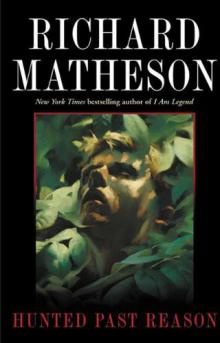 Hunted Past Reason
Hunted Past Reason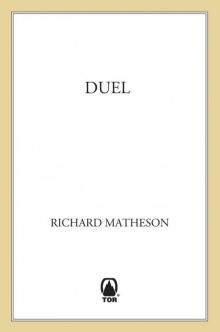 Duel: Terror Stories
Duel: Terror Stories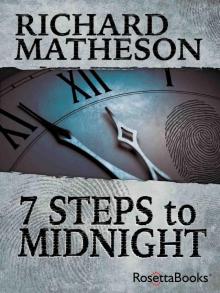 7 Steps to Midnight
7 Steps to Midnight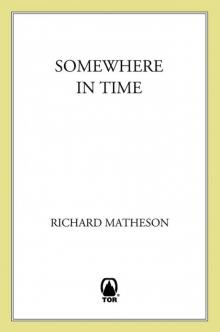 Somewhere in Time
Somewhere in Time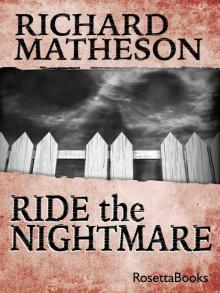 Ride the Nightmare
Ride the Nightmare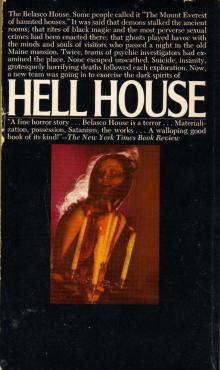 Hell House
Hell House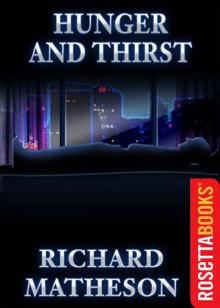 Hunger and Thirst
Hunger and Thirst Lyrics
Lyrics Other Kingdoms
Other Kingdoms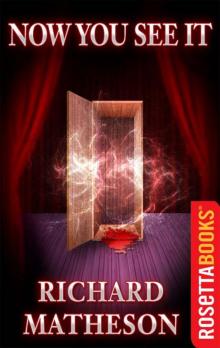 Now You See It . . .
Now You See It . . .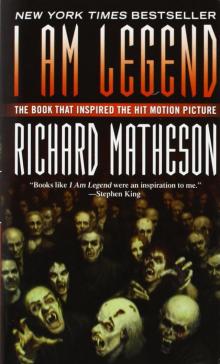 I Am Legend
I Am Legend The Box: Uncanny Stories
The Box: Uncanny Stories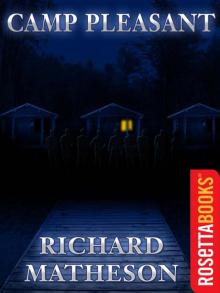 Camp Pleasant
Camp Pleasant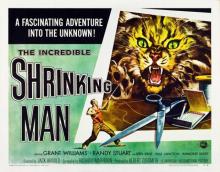 The Incredible Shrinking Man
The Incredible Shrinking Man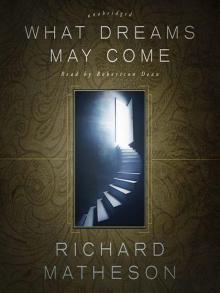 What Dreams May Come
What Dreams May Come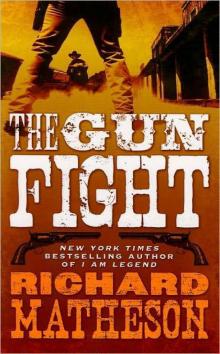 The Gun Fight
The Gun Fight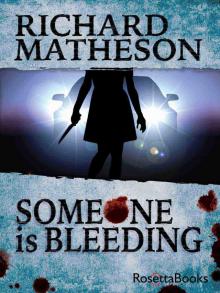 Someone Is Bleeding
Someone Is Bleeding Mediums Rare
Mediums Rare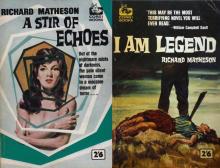 A Stir of Echoes
A Stir of Echoes Backteria and Other Improbable Tales
Backteria and Other Improbable Tales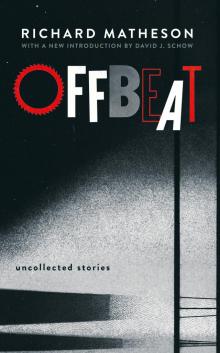 Offbeat: Uncollected Stories
Offbeat: Uncollected Stories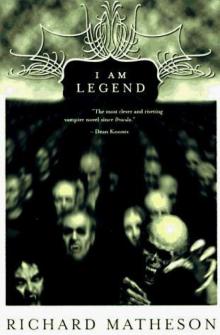 I Am Legend and Other Stories
I Am Legend and Other Stories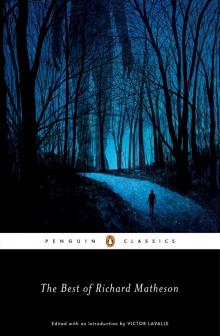 The Best of Richard Matheson
The Best of Richard Matheson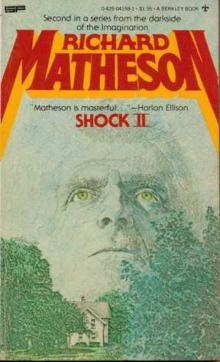 Shock II
Shock II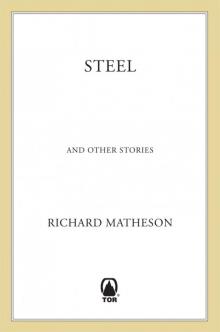 Steel: And Other Stories
Steel: And Other Stories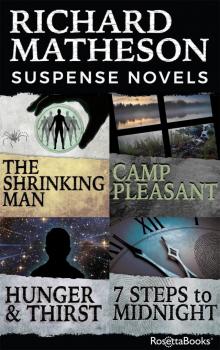 Richard Matheson Suspense Novels
Richard Matheson Suspense Novels The Link
The Link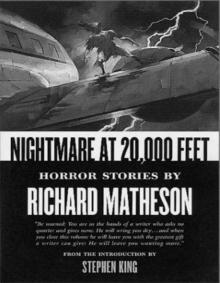 Nightmare At 20,000 Feet
Nightmare At 20,000 Feet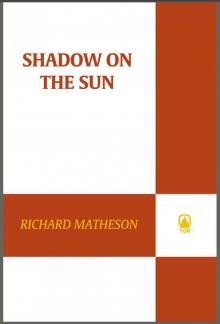 Shadow on the Sun
Shadow on the Sun![Steel and other stories [SSC] Read online](http://i1.bookreadfree.com/i/03/21/steel_and_other_stories_ssc_preview.jpg) Steel and other stories [SSC]
Steel and other stories [SSC] Created By
Created By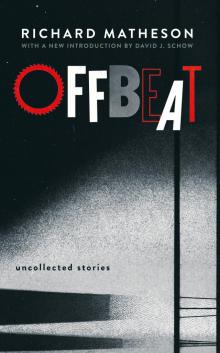 Offbeat
Offbeat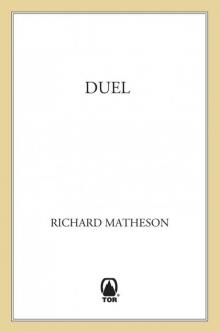 Duel
Duel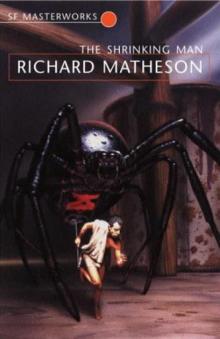 The Shrinking Man
The Shrinking Man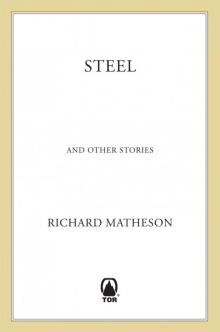 Steel
Steel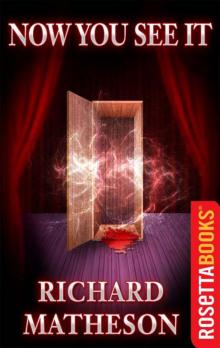 Now You See It
Now You See It